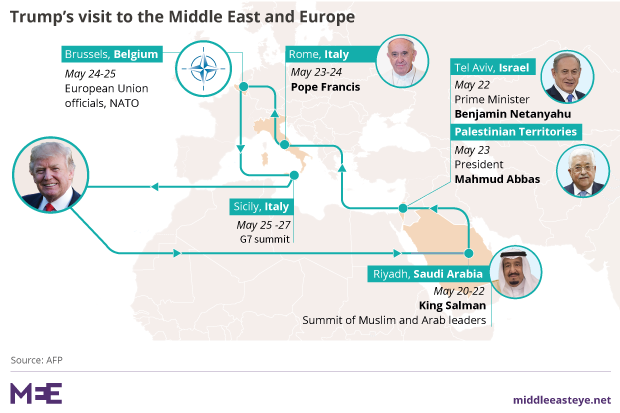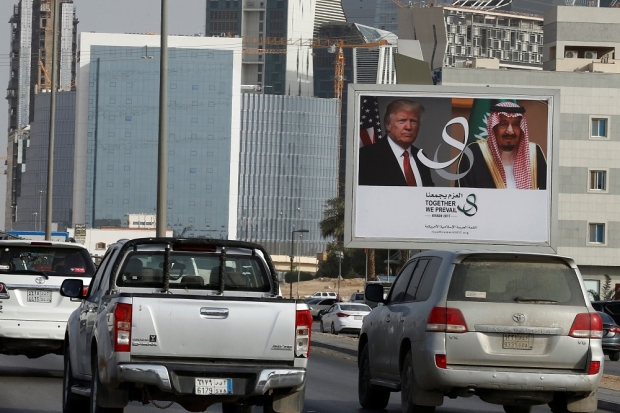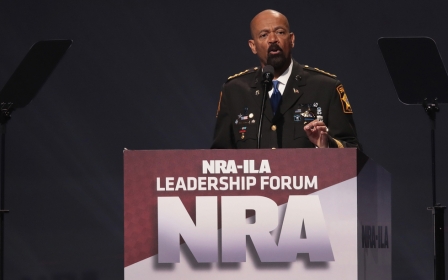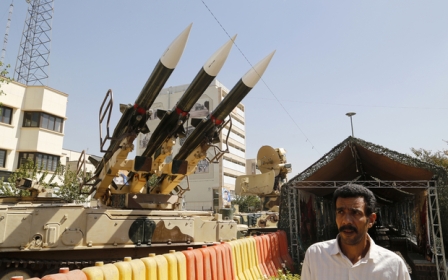Trump steps onto world stage as scandals rock White House
From Riyadh to Jerusalem, Bethlehem, Rome, Brussels and Sicily, Donald Trump left a swirl of domestic woes behind on Friday as he embarked on a first foreign trip that will be closely watched in capitals the world over.
Trump's extraordinarily dense first trip - six stops in eight days, and countless face-to-face meetings from Saudi King Salman to Pope Francis via France's new leader, Emmanuel Macron - is fraught with fresh perils for the new president.
The avalanche of revelations in the run-up to his departure have eroded Trump's standing at home - where the parallels with Richard Nixon's ill-fated presidency are now being openly drawn.
They also revived questions about his ability to strike a presidential tone with his foreign counterparts.
"Truth is, nobody knows how Donald Trump is going to act or what he's going to say in meetings of this kind because he's never done it before," summed up Stephen Sestanovich of the Council on Foreign Relations.
Scandals at home
As Trump departed on Friday, two more controversies surfaced in Washington, adding to the president's domestic woes.
The Washington Post reported that the investigation into the Trump campaign's possible coordination with Russia is looking into a White House adviser who is close to the president. And a New York Times report revealed that Trump told Russian officials a day after firing FBI director James Comey that the dismissal relieved a "great pressure" the White House was facing from the probe.
"I just fired the head of the FBI. He was crazy, a real nut job," Trump said, according to the Times, which cited a document read to it by a US official. "I faced great pressure because of Russia. That’s taken off."
The Times said the document was based on notes taken from inside the Oval Office.
The White House did not deny the Times' report, and Press Secretary Sean Spicer reiterated that Comey was fired for the way he pursued the Russia investigation.
"By grandstanding and politicising the investigation into Russia’s actions, James Comey created unnecessary pressure on our ability to engage and negotiate with Russia," Spicer said, according to the Times.
"The investigation would have always continued, and obviously, the termination of Comey would not have ended it. Once again, the real story is that our national security has been undermined by the leaking of private and highly classified conversations."
The Post, whose report relies on sources familiar with the probe, did not identify the senior White House official who is of interest of the Russia investigation, but it said the investigation has reached the "highest levels of government".
The probe is now being led by former FBI Director Robert Mueller, who, appointed on Wednesday, is serving as an independent special counsel.
"Getting ready for my big foreign trip. Will be strongly protecting American interests - that's what I like to do!" he said on Twitter before his departure.
On foreign policy, the president has pulled back from his most provocative campaign pledges, towards a stance in many respects similar to his predecessor Barack Obama.
But the real estate magnate will still need to explain to foreign partners how his favorite slogan - "America First" - can be compatible with multilateralism.
"President Trump understands that America First does not mean American alone - to the contrary," insisted his national security advisor, H.R. McMaster.
Catchphrases aside, many questions remain unanswered.
Yemen's Houthi movement said on Friday it fired a ballistic missile toward Riyadh and the Arab coalition waging war in Yemen said it had intercepted and destroyed a projectile around 200 km west of the city.
The incident took place while Trump was preparing to leave Washington for the Saudi capital, highlighting the challenges that await the US president in the region.
Speech on Islam
The White House touts a "historic" trip during which Trump - in visits to Saudi Arabia, the Vatican and Jerusalem - will reach out to leaders of the world's major monotheistic faiths.
During his two days in Riyadh, he will likely seek to strike a contrast with Obama, who was widely viewed with suspicion by the monarchies of the Gulf.
The combination of tough talk on Iran, a lower-key focus on human rights, and the likely announcement of new arms deals should in theory earn the US leader a warm welcome.
Trump's delivery of a speech on Islam before dozens of Muslim leaders gathered in the Saudi capital could prove a far more delicate exercise, however, given the tensions sparked by his travel ban targeting several Muslim-majority nations - now stuck in the US courts.
"I'll speak with Muslim leaders and challenge them to fight hatred and extremism, and embrace a peaceful future for their faith," Trump promised ahead of the trip.
In Israel, Trump has hopes - though it is still unclear how - of reviving the moribund peace process, meeting both his "friend" Benjamin Netanyahu in Jerusalem, and Palestinian president Mahmoud Abbas in Bethlehem.
But the Israeli leg of his trip is already awash in controversy - from a row over his visit to Jerusalem's Western Wall, the holiest prayer site for Jews, to Trump's alleged disclosure of Israeli intelligence to Russian officials.
Trump's meeting with Pope Francis - two men at odds on everything from climate change to refugee policy - remains highly unpredictable, although the pontiff says he will give America's bullish leader an open-minded hearing.
Finally, the president's trip will wrap up in Europe where his shifting pronouncements on Brexit, NATO and the future of the European Union have sown confusion among longstanding allies.
Trump will meet members of the North Atlantic alliance in Brussels, before heading on to a G7 summit in Taormina, a picturesque Sicilian town overlooking the Mediterranean.
The Nixon trip
How his trip is perceived by fellow Americans is key for the president.
Well aware of heightened concerns about militancy, the Republican president hopes to bring back hard commitments from US allies in the fight against the Islamic State (IS) group.
But however powerful the images of Trump's globe-trotting turn out to be, they have little chance of eclipsing the scandals convulsing his White House back home.
For ex-CIA analyst Bruce Riedel, a senior fellow at the Brookings Institution, the comparison that springs most obviously to mind is with Nixon's 1974 trip to the Middle East, which he hoped would yield a diplomatic success to "divert attention away from the Watergate scandal".
"It did not work," said Riedel.
"The American media concentrated on the Watergate scandal, they treated the trip as a side show... and the Watergate scandal kept dripping and dripping."
Middle East Eye propose une couverture et une analyse indépendantes et incomparables du Moyen-Orient, de l’Afrique du Nord et d’autres régions du monde. Pour en savoir plus sur la reprise de ce contenu et les frais qui s’appliquent, veuillez remplir ce formulaire [en anglais]. Pour en savoir plus sur MEE, cliquez ici [en anglais].






